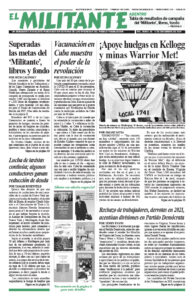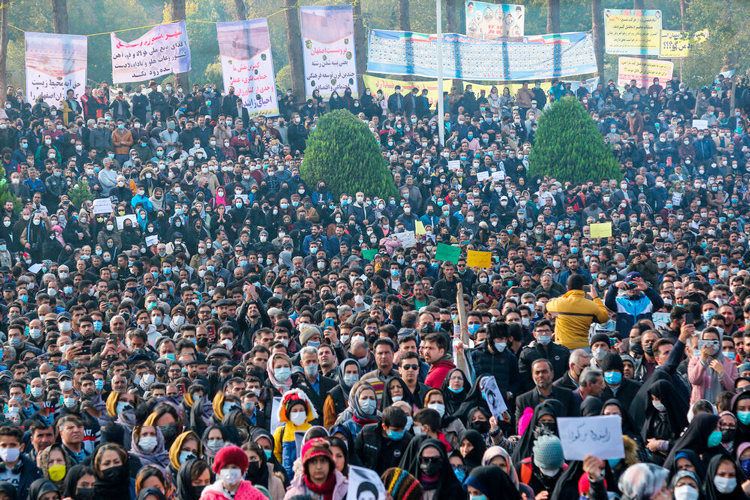Tens of thousands of farmers and other working people filled the dried riverbed and banks of the Zayanderud River in Isfahan, in central Iran, Nov. 19, culminating over a week of protests demanding the government take steps to relieve a more than two-decade-long water shortage.
Protesters chanted, “Farmers! Farmers! We support you!” “Plundered for 20 years, the water must return,” and “Give Isfahan a chance to breathe.” One sign read, “Our children want water to provide food for your children.” Photos published in official government media showed banners reading, “Our water is being held hostage.” Isfahan, some 250 miles south of Tehran, is Iran’s third largest city, with 2 million people.
The dried up river has become a symbol of the inability and lack of will of the bourgeois clerical regime to meet the most basic needs of working people. Scarcity of water is a result of authorities diverting it to nearby factories and other provinces to boost profits and priorities on top of declining rainfall.
Isfahan farmers have been protesting for years. In 2012 farmers clashed with police in a rural town of the province, breaking a pipe that diverted water to Yazd province to the east.
Authorities occasionally release water from the Zayanderud Dam 75 miles to the west and the river flows again, but never for long. When it does flow, people gather along the banks and celebrate.
Increasing demand for water has been exacerbated by government demands for farmers to expand agricultural production without regard to the supply of water required.
Alongside the government’s failure to provide basic necessities, working people also face severe price rises exacerbated by Washington’s punishing sanctions. The U.S. rulers are pressuring the Iranian regime to end its nuclear weapons program and cease its military operations in the region.
Similar protests in predominantly Arab Khuzestan province in the southwest of the country in July were attacked by police when residents there took to the streets shouting, “I am thirsty!” Anti-riot police beat protesters with batons, fired tear gas and shot and killed three people.
Protests in Khuzestan spread to several cities where demonstrators also demanded a halt to the regime’s military intervention in the Middle East. Working people have borne the human and financial costs of these deadly conflicts. Both the pressures from the U.S. rulers’ sanctions and the costs of the Iranian rulers’ counterrevolutionary interventions in the region affect their ability to grapple with things like the water crisis.
Some 90% of Iran’s total water consumption is used for agriculture. In June Iran’s National Water & Sewage Co. classified some 210 cities as “water stressed.” With so much water being pumped out of underground aquifers, the ground is literally shifting in parts of 30 of Iran’s 31 provinces.
The government’s English-language Tehran Times notes that “farmers in Isfahan are complaining that a considerable portion of Zayanderud water is used by industrial complexes. This is true.” The paper also admits that tremendous amounts of water are wasted and could be recycled.
Water-intensive crops grown by larger capitalist farmers, like rice, receive government favor over less profitable crops such as wheat, barley and beans.
The protests in Isfahan have been so large and popular that the regime has not felt capable of moving to repress them, in the way that other protests by toilers in recent years have been subjected to.
“I have ordered the ministers of energy and agriculture to take immediate steps to deal with this issue,” First Vice President Mohammad Mokhber announced.


